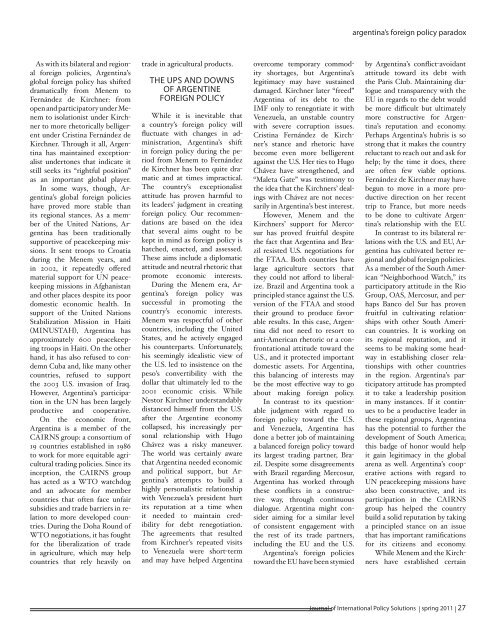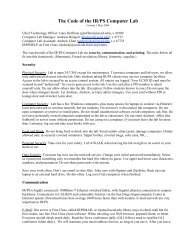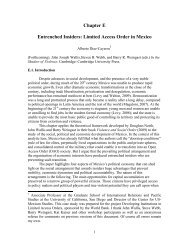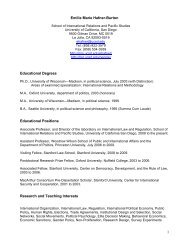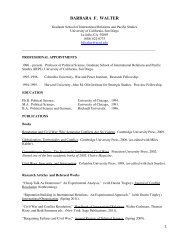to download the full journal. (1.2MB PDF) - School of International ...
to download the full journal. (1.2MB PDF) - School of International ...
to download the full journal. (1.2MB PDF) - School of International ...
Create successful ePaper yourself
Turn your PDF publications into a flip-book with our unique Google optimized e-Paper software.
argentina’s foreign policy paradox<br />
As with its bilateral and regional<br />
foreign policies, Argentina’s<br />
global foreign policy has shifted<br />
dramatically from Menem <strong>to</strong><br />
Fernández de Kirchner: from<br />
open and participa<strong>to</strong>ry under Menem<br />
<strong>to</strong> isolationist under Kirchner<br />
<strong>to</strong> more rhe<strong>to</strong>rically belligerent<br />
under Cristina Fernández de<br />
Kirchner. Through it all, Argentina<br />
has maintained exceptionalist<br />
under<strong>to</strong>nes that indicate it<br />
still seeks its “rightful position”<br />
as an important global player.<br />
In some ways, though, Argentina’s<br />
global foreign policies<br />
have proved more stable than<br />
its regional stances. As a member<br />
<strong>of</strong> <strong>the</strong> United Nations, Argentina<br />
has been traditionally<br />
supportive <strong>of</strong> peacekeeping missions.<br />
It sent troops <strong>to</strong> Croatia<br />
during <strong>the</strong> Menem years, and<br />
in 2002, it repeatedly <strong>of</strong>fered<br />
material support for UN peacekeeping<br />
missions in Afghanistan<br />
and o<strong>the</strong>r places despite its poor<br />
domestic economic health. In<br />
support <strong>of</strong> <strong>the</strong> United Nations<br />
Stabilization Mission in Haiti<br />
(MINUSTAH), Argentina has<br />
approximately 600 peacekeeping<br />
troops in Haiti. On <strong>the</strong> o<strong>the</strong>r<br />
hand, it has also refused <strong>to</strong> condemn<br />
Cuba and, like many o<strong>the</strong>r<br />
countries, refused <strong>to</strong> support<br />
<strong>the</strong> 2003 U.S. invasion <strong>of</strong> Iraq.<br />
However, Argentina’s participation<br />
in <strong>the</strong> UN has been largely<br />
productive and cooperative.<br />
On <strong>the</strong> economic front,<br />
Argentina is a member <strong>of</strong> <strong>the</strong><br />
CAIRNS group: a consortium <strong>of</strong><br />
19 countries established in 1986<br />
<strong>to</strong> work for more equitable agricultural<br />
trading policies. Since its<br />
inception, <strong>the</strong> CAIRNS group<br />
has acted as a WTO watchdog<br />
and an advocate for member<br />
countries that <strong>of</strong>ten face unfair<br />
subsidies and trade barriers in relation<br />
<strong>to</strong> more developed countries.<br />
During <strong>the</strong> Doha Round <strong>of</strong><br />
WTO negotiations, it has fought<br />
for <strong>the</strong> liberalization <strong>of</strong> trade<br />
in agriculture, which may help<br />
countries that rely heavily on<br />
trade in agricultural products.<br />
THE UPS AND DOWNS<br />
OF ARGENTINE<br />
FOREIGN POLICY<br />
While it is inevitable that<br />
a country’s foreign policy will<br />
fluctuate with changes in administration,<br />
Argentina’s shift<br />
in foreign policy during <strong>the</strong> period<br />
from Menem <strong>to</strong> Fernández<br />
de Kirchner has been quite dramatic<br />
and at times impractical.<br />
The country’s exceptionalist<br />
attitude has proven harmful <strong>to</strong><br />
its leaders’ judgment in creating<br />
foreign policy. Our recommendations<br />
are based on <strong>the</strong> idea<br />
that several aims ought <strong>to</strong> be<br />
kept in mind as foreign policy is<br />
hatched, enacted, and assessed.<br />
These aims include a diplomatic<br />
attitude and neutral rhe<strong>to</strong>ric that<br />
promote economic interests.<br />
During <strong>the</strong> Menem era, Argentina’s<br />
foreign policy was<br />
successful in promoting <strong>the</strong><br />
country’s economic interests.<br />
Menem was respectful <strong>of</strong> o<strong>the</strong>r<br />
countries, including <strong>the</strong> United<br />
States, and he actively engaged<br />
his counterparts. Unfortunately,<br />
his seemingly idealistic view <strong>of</strong><br />
<strong>the</strong> U.S. led <strong>to</strong> insistence on <strong>the</strong><br />
peso’s convertibility with <strong>the</strong><br />
dollar that ultimately led <strong>to</strong> <strong>the</strong><br />
2001 economic crisis. While<br />
Nes<strong>to</strong>r Kirchner understandably<br />
distanced himself from <strong>the</strong> U.S.<br />
after <strong>the</strong> Argentine economy<br />
collapsed, his increasingly personal<br />
relationship with Hugo<br />
Chávez was a risky maneuver.<br />
The world was certainly aware<br />
that Argentina needed economic<br />
and political support, but Argentina’s<br />
attempts <strong>to</strong> build a<br />
highly personalistic relationship<br />
with Venezuela’s president hurt<br />
its reputation at a time when<br />
it needed <strong>to</strong> maintain credibility<br />
for debt renegotiation.<br />
The agreements that resulted<br />
from Kirchner’s repeated visits<br />
<strong>to</strong> Venezuela were short-term<br />
and may have helped Argentina<br />
overcome temporary commodity<br />
shortages, but Argentina’s<br />
legitimacy may have sustained<br />
damaged. Kirchner later “freed”<br />
Argentina <strong>of</strong> its debt <strong>to</strong> <strong>the</strong><br />
IMF only <strong>to</strong> renegotiate it with<br />
Venezuela, an unstable country<br />
with severe corruption issues.<br />
Cristina Fernández de Kirchner’s<br />
stance and rhe<strong>to</strong>ric have<br />
become even more belligerent<br />
against <strong>the</strong> U.S. Her ties <strong>to</strong> Hugo<br />
Chávez have streng<strong>the</strong>ned, and<br />
“Maleta Gate” was testimony <strong>to</strong><br />
<strong>the</strong> idea that <strong>the</strong> Kirchners’ dealings<br />
with Chávez are not necessarily<br />
in Argentina’s best interest.<br />
However, Menem and <strong>the</strong><br />
Kirchners’ support for Mercosur<br />
has proved fruitful despite<br />
<strong>the</strong> fact that Argentina and Brazil<br />
resisted U.S. negotiations for<br />
<strong>the</strong> FTAA. Both countries have<br />
large agriculture sec<strong>to</strong>rs that<br />
<strong>the</strong>y could not afford <strong>to</strong> liberalize.<br />
Brazil and Argentina <strong>to</strong>ok a<br />
principled stance against <strong>the</strong> U.S.<br />
version <strong>of</strong> <strong>the</strong> FTAA and s<strong>to</strong>od<br />
<strong>the</strong>ir ground <strong>to</strong> produce favorable<br />
results. In this case, Argentina<br />
did not need <strong>to</strong> resort <strong>to</strong><br />
anti-American rhe<strong>to</strong>ric or a confrontational<br />
attitude <strong>to</strong>ward <strong>the</strong><br />
U.S., and it protected important<br />
domestic assets. For Argentina,<br />
this balancing <strong>of</strong> interests may<br />
be <strong>the</strong> most effective way <strong>to</strong> go<br />
about making foreign policy.<br />
In contrast <strong>to</strong> its questionable<br />
judgment with regard <strong>to</strong><br />
foreign policy <strong>to</strong>ward <strong>the</strong> U.S.<br />
and Venezuela, Argentina has<br />
done a better job <strong>of</strong> maintaining<br />
a balanced foreign policy <strong>to</strong>ward<br />
its largest trading partner, Brazil.<br />
Despite some disagreements<br />
with Brazil regarding Mercosur,<br />
Argentina has worked through<br />
<strong>the</strong>se conflicts in a constructive<br />
way, through continuous<br />
dialogue. Argentina might consider<br />
aiming for a similar level<br />
<strong>of</strong> consistent engagement with<br />
<strong>the</strong> rest <strong>of</strong> its trade partners,<br />
including <strong>the</strong> EU and <strong>the</strong> U.S.<br />
Argentina’s foreign policies<br />
<strong>to</strong>ward <strong>the</strong> EU have been stymied<br />
by Argentina’s conflict-avoidant<br />
attitude <strong>to</strong>ward its debt with<br />
<strong>the</strong> Paris Club. Maintaining dialogue<br />
and transparency with <strong>the</strong><br />
EU in regards <strong>to</strong> <strong>the</strong> debt would<br />
be more difficult but ultimately<br />
more constructive for Argentina’s<br />
reputation and economy.<br />
Perhaps Argentina’s hubris is so<br />
strong that it makes <strong>the</strong> country<br />
reluctant <strong>to</strong> reach out and ask for<br />
help; by <strong>the</strong> time it does, <strong>the</strong>re<br />
are <strong>of</strong>ten few viable options.<br />
Fernández de Kirchner may have<br />
begun <strong>to</strong> move in a more productive<br />
direction on her recent<br />
trip <strong>to</strong> France, but more needs<br />
<strong>to</strong> be done <strong>to</strong> cultivate Argentina’s<br />
relationship with <strong>the</strong> EU.<br />
In contrast <strong>to</strong> its bilateral relations<br />
with <strong>the</strong> U.S. and EU, Argentina<br />
has cultivated better regional<br />
and global foreign policies.<br />
As a member <strong>of</strong> <strong>the</strong> South American<br />
“Neighborhood Watch,” its<br />
participa<strong>to</strong>ry attitude in <strong>the</strong> Rio<br />
Group, OAS, Mercosur, and perhaps<br />
Banco del Sur has proven<br />
fruitful in cultivating relationships<br />
with o<strong>the</strong>r South American<br />
countries. It is working on<br />
its regional reputation, and it<br />
seems <strong>to</strong> be making some headway<br />
in establishing closer relationships<br />
with o<strong>the</strong>r countries<br />
in <strong>the</strong> region. Argentina’s participa<strong>to</strong>ry<br />
attitude has prompted<br />
it <strong>to</strong> take a leadership position<br />
in many instances. If it continues<br />
<strong>to</strong> be a productive leader in<br />
<strong>the</strong>se regional groups, Argentina<br />
has <strong>the</strong> potential <strong>to</strong> fur<strong>the</strong>r <strong>the</strong><br />
development <strong>of</strong> South America;<br />
this badge <strong>of</strong> honor would help<br />
it gain legitimacy in <strong>the</strong> global<br />
arena as well. Argentina’s cooperative<br />
actions with regard <strong>to</strong><br />
UN peacekeeping missions have<br />
also been constructive, and its<br />
participation in <strong>the</strong> CAIRNS<br />
group has helped <strong>the</strong> country<br />
build a solid reputation by taking<br />
a principled stance on an issue<br />
that has important ramifications<br />
for its citizens and economy.<br />
While Menem and <strong>the</strong> Kirchners<br />
have established certain<br />
Journal <strong>of</strong> <strong>International</strong> Policy Solutions | spring 2011 | 27


